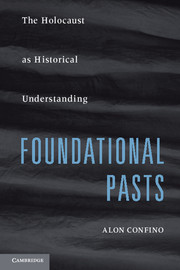1 - Between the French Revolution and the Holocaust
Events That Represent an Age
from Part One - Thinking the Holocaust
Published online by Cambridge University Press: 05 June 2012
Summary
I begin with several points of departure that articulate opposed and related qualities that have dominated the understanding of the French Revolution and the Holocaust. These qualities raise topics that frame the discussion of this book and form insights that outline an understanding of the Holocaust as a problem of culture.
Both the French Revolution and the Holocaust have provided, first of all, a moral-historical compass, although with different human inflections and political directions. While after 1789 the Revolution was both embraced and rejected, the Holocaust is now universally condemned as evil. This difference carries interpretive consequences. As a moral compass, the Revolution pointed to diametrically opposed directions. The revolutionaries, as well as successive Marxist and liberal historians, viewed it as an agent of progress and liberty that propelled premodern France, Europe, and the world into the modern era. This view was shared by historians as different as Alfred Cobban (1901–1968), the British liberal historian who launched a massive attack against the Marxist interpretation of the Revolution, and Albert Soboul (1914–1982), the French Marxist who held the prestigious chair of the History of the French Revolution at the Sorbonne. The Revolution was a source of political inspiration and imitation for generations of republicans, socialists, and communists, and even the Terror found defenders, particularly among Marxist historians such as Soboul and Albert Mathiez (1874–1932), who devoted most of his career to studying and championing Robespierre.
- Type
- Chapter
- Information
- Foundational PastsThe Holocaust as Historical Understanding, pp. 17 - 36Publisher: Cambridge University PressPrint publication year: 2011



